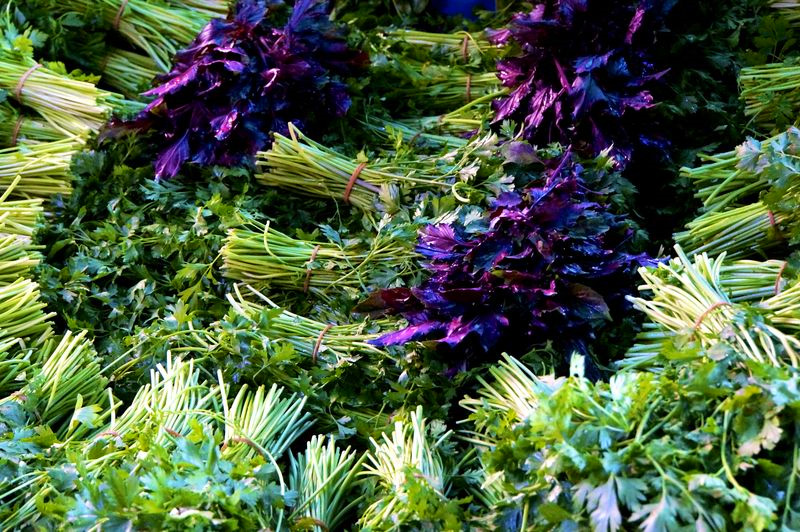
I spent Sunday teaching a cooking with herbs class to a wonderful bunch of students at the Boston Herbstalk 2014 Festival. Herbstalk brings together fascinating teachers, eager students, and prolific vendors for a weekend conference dedicated to sharing herbal education in an urban community. It’s really a fun event!
My class was focused on understanding and appreciating the medicinal properties of culinary herbs. We often think of these herbs as being part of our diet for taste, but in fact they have a deep history in medicinal healing. I love re-framing our concept of these ‘common’ herbs into powerful medicine. They can be used as a regular part of our diet to support preventative health and boost nutrient density (herbs are PACKED with vitamins, minerals, and antioxidants), or as a healing tool during times when we need extra support.
Here are my top 11 culinary herbs and their medicinal actions (I tried to make it a top 10, but I just couldn’t!).
Basil: Basil is anti-inflammatory and often used to treat stress, tension, depression, and nervous indigestion. It can also help stimulate appetite and ease overall stomach upset. Because of basil’s high levels of flavonoids and antioxidants, it helps prevent cell damage. Here’s a great summer pesto recipe to use your basil.
Black Pepper: Black pepper has a long history as a tonic herb in Chinese medicine. It is a warming herb that has energizing, anti-inflammatory and stimulating properties. It is particularly effective for colds, flus, or times of poor circulation. Black pepper is also a digestive aid and helps relieve gas, bloating, and constipation.
Cinnamon: Cinnamon has a wonderful warming action in the body. It is a carminative herb that stimulates digestion, increases poor circulation, and supports stabilized blood sugar. It is also anti-bacterial and anti-microbial. Here’s a bit more info on cinnamon from my visit to a spice farm in Costa Rica.
Garlic: Garlic is one of nature’s strongest antibiotics. It can be used to effectively fight bacteria, viruses, and fungal infestations. In addition to attacking foreign pathogens in the body, garlic also boosts the immune system. Garlic is also supportive of the cardiovascular system and can be used to lower cholesterol levels and reduce blood pressure. It’s best to eat garlic raw to maximize the medicinal benefits. Try this garlic scape pesto for a new twist on garlic flavors.
Ginger: Ginger is a superstar when it comes to stomach upset. It increases circulation to digestive organs and helps ease nausea, stomach pain, and gas. It can be used for morning sickness, motion sickness, irritable bowel disorders, food poisoning, or viruses. Ginger is also a warming herb and can be used as a decongestant or to reduce inflammation in the body. It is anti-bacterial and anti-microbial, so it’s effective at fighting off colds, flus, and infections – use ginger when you feel you’re fighting something, as well as once you have a bug.
Mint: Mint is cooling, calming, and anti-inflammatory. It supports the digestive system, colds/flus, and headaches. It is often taken internally as a tea or oil, or inhaled through a steam. The essential oil can also be massaged into the temples. Although mint is calming to the body overall, it can also be used as an invigorating pick-me-up for people battling fatigue.
Oregano: Oregano is a strong anti-viral, anti-microbial, and anti-fungal herb. It is excellent at boosting the immune system, calming the digestive system, and supporting respiratory issues and infections.
Rosemary: Rosemary is used often for treating and supporting the mind. It is effective at relieving headaches (including migraines), boosts memory, helps with depression, and supports overall brain function. Rosemary is nourishing to the nervous system and helps support healthy stress management. It is also a carminative herb that stimulates digestion and helps the body break down fats (hence the addition of rosemary to many roasted meats).
Sage: My favorite use for sage is to move fluids in the body – supporting lymphatic flow, removing mucus, regulating milk supply, and cleansing toxins. Sage is also anti-inflammatory and particularly effective at easing digestive discomfort and inflammation in the mouth (canker sores, tooth aches, sore throats etc.). Sage is anti-bacterial and boosts the immune system.
Thyme: Thyme has a particular affinity for the respiratory system – it is effective for coughs, congestion, and colds. Thyme is both anti-bacterial and anti-biotic, making it useful as part of your immune-boosting regimen. It can be inhaled through a steam, ingested in both teas and tinctures, and used topically as a wash for wounds or infections. Thyme is also an effective digestive aid by stimulating the release of bile and other digestive juices.
Turmeric: Turmeric is one of the strongest anti-inflammatory herbs in our arsenal. It can be used to combat all forms of inflammation in the body – both acute reactions (sore throat or pulled muscle) and chronic inflammation (arthritis, IBS, asthma). Turmeric is also an effective digestive aid. I have tons of recipes that use turmeric, but this carrot and squash tagine is one of my favorites.
Zoe! Great article I pinned to my nutrition board! Cheers from Keep The Beet! Trish